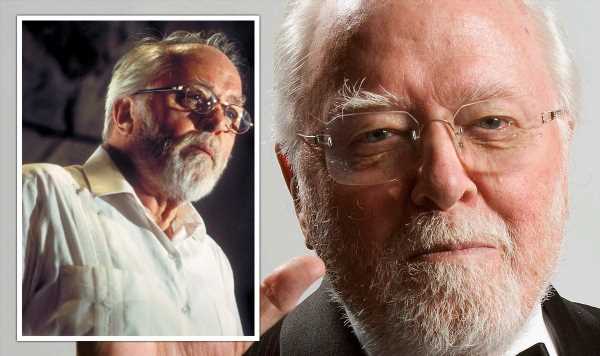Richard Attenborough – Jurassic Park (1-10) Movie CLIP – Welcome to Jurassic Park (1993) HD
We use your sign-up to provide content in ways you’ve consented to and to improve our understanding of you. This may include adverts from us and 3rd parties based on our understanding. You can unsubscribe at any time. More info
The Great Escape star’s death in 2014 five days before his 91st birthday troubled masses of fans. Sir Roger Moore wrote on Twitter that he was “greatly saddened” by the death of the “great Attenborough” who he described as a “wonderful” and “talented man”. Lord Attenborough won two Oscars for his film Ghandi in 1983, and was widely recognised for his later role in Jurassic Park. What happened to the star?
Lord Attenborough suffered a catastrophic accident six years before his death which affected his mobility and speaking ability.
The star spent his remaining days in a wheelchair.
He was rushed to hospital in 2008 after falling down a set of stairs and hitting his head on a nearby ledge.
Around the time of his death, Lord Attenborough’s son Michael revealed the extent of his injuries which burdened Lord Attenborough for the rest of his days.

“He hit his head very badly and I have no idea how he survived,” Michael Attenborough told The Mirror after Lord Attenborough’s death.“When he emerged after 18 months in hospital, he was obviously not the same man.
“The two things it was terrible to take away from my dad were his activity and articulation.”
Often people who undergo traumatic brain injuries may have slower and spurred speech.
They may even find it impossible to understand language if particular areas of the brain linked to language are damaged.
DON’T MISS:
Dysarthria is the medical term used to describe when people are no longer able to speak because the part of the brain responsible for the speech muscles is damaged.
However, dysarthria is often coupled with aphasia, which is when the areas related to language expression and comprehension are damaged.
Three years after his injury, Lord Attenborough’s brother David explained to the Mail Online that Richard was “unconscious for a long time”.
Years later and five months after his brother’s death, he also told The Mirror: “All people who’ve sustained those kinds of injuries… of course they change.

“He was a very dear brother and he is missed.”
The NHS offers advice on caring for people with dysarthria.
They suggest reducing distractions and background noise if you’re talking to someone with the health condition.
They also suggest asking for yes or no clarification when the person speaks, such as asking “did you ask how I am?”.

They also advise people not to pretend to understand people you’re speaking to with dysarthria – as this can be upsetting, explained the health body.
Dysarthria, as well as aphasia, can also be caused by brain damage early on in life, such as the onset of cerebral palsy.
It can also be acquired from conditions such as Parkinson’s disease or motor neurone disease.
Aphasia can also be acquired because of these conditions as well.
Source: Read Full Article
